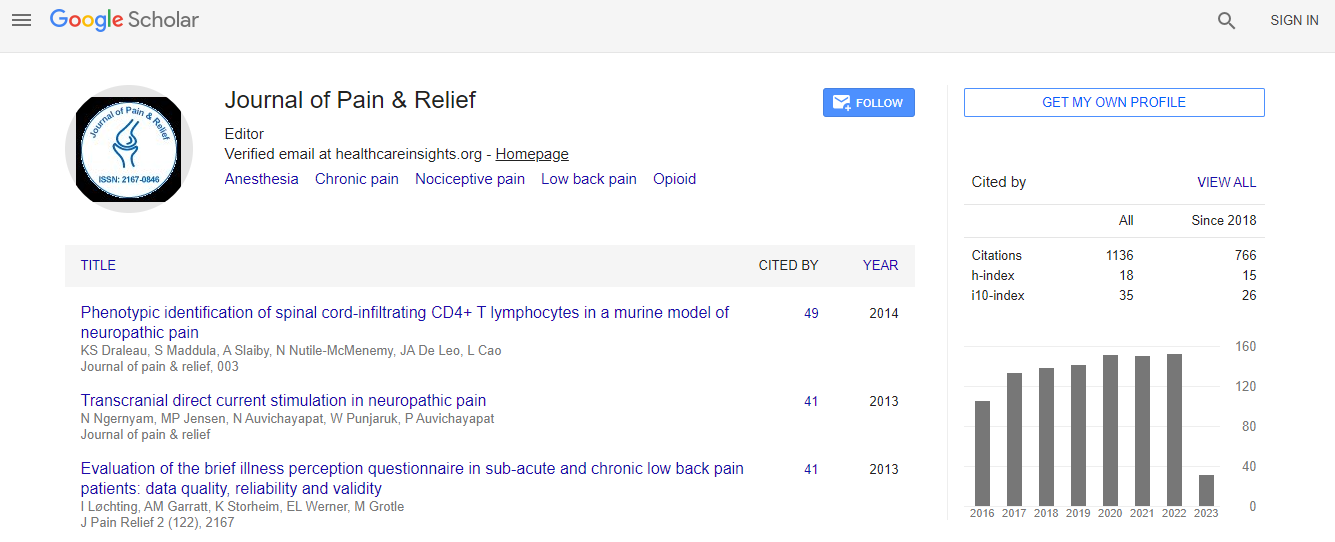Our Group organises 3000+ Global Conferenceseries Events every year across USA, Europe & Asia with support from 1000 more scientific Societies and Publishes 700+ Open Access Journals which contains over 50000 eminent personalities, reputed scientists as editorial board members.
Open Access Journals gaining more Readers and Citations
700 Journals and 15,000,000 Readers Each Journal is getting 25,000+ Readers
Recommended Conferences
42nd Global Conference on Nursing Care & Patient Safety
Toronto, CanadaGoogle Scholar citation report
Citations : 1583
Journal of Pain & Relief received 1583 citations as per Google Scholar report
Journal of Pain & Relief peer review process verified at publons
Indexed In
- Index Copernicus
- Google Scholar
- Open J Gate
- Genamics JournalSeek
- Cosmos IF
- RefSeek
- Hamdard University
- EBSCO A-Z
- OCLC- WorldCat
- Publons
- Geneva Foundation for Medical Education and Research
- Euro Pub
- ICMJE
Useful Links
Recommended Journals
Related Subjects
Share This Page
Chronic post-thoracotomy pain (CPTP): Do current analgesic techniques affect outcomes?
5th International Conference and Exhibition on Pain Research And Management
Fang Gao
University of Birmingham, UK
ScientificTracks Abstracts: J Pain Relief
Abstract
An estimated 7200 thoracotomies (surgical incision into the chest wall) are performed annually in the UK, most commonly to treat lung cancer. It is considered one of the most painful surgical procedures due to tissue, muscle and nerve damage from the incision and wound retraction. Inevitable wound movement during respiration after surgery and intercostal traumatic nerve injury can result in a high risk of persistent pain for months after surgery. The incidence of this chronic post-thoracotomy pain (CPTP; defined as pain that recurs or persists at least two months following the surgery) has been reported to be as high as 50%. Two main analgesic techniques are commonly used for perioperative pain control during thoracotomy. TEB (Thoracic epidural block) blocks nerves in the chest, bilaterally, at the spinal cord level. It acts by reducing onward transmission of painful nerve signals but may not abolish them completely. PVB involves injecting local anesthetic into the paravertebral space on the side of surgery and may completely block painful nerve signals from reaching the spinal cord. This total blockade of nerve signals could remove the stimulus for ├ó┬?┬?central sensitization├ó┬?┬? which underpins the formation of chronic pain pathways. PVB could be uniquely effective in preventing long-term pain, and there is evidence from a recent trial of two techniques in breast surgery to support this premise. With limited current evidence to dictate the most effective choice of analgesic technique in preventing CPTP, current UK practice varies greatly. A recent Cochrane Review recommended that a high quality randomised controlled trial (RCT) to compare TEB and PVB with the primary outcome of chronic pain is urgently needed. A pilot trial (TOPIC ├ó┬?┬? feasibility of RCT to investigate the effectiveness of TEB and PVB in reducing Chronic Post-Thoracotomy Pain) has recently completed in the UK demonstrating that a larger trial is feasible in terms of recruitment and retention. Now it is the ideal time to launch a substantive trial that conclusively answers this important question.Biography
Fang Gao is a Professor in Anaesthesia, Critical Care and Pain Medicine, College of Medicine and Dental Science, University of Birmingham. She is a Consultant Anaesthetist and Intensitivist, Heart of England NHS Foundation Trust, England, UK. She leads Perioperative, Critical Care and Trauma Trials Group, and has special research interest in clinical trials in these areas. She was awarded a prestigious National Institute for Health Research (NIHR, England) Senior Investigator award in 2015, and was an inaugural Innovation Award Winner 2016, West Midlands Academic Health Science Network (AHSN), for best impact of the clinical trial.

 Spanish
Spanish  Chinese
Chinese  Russian
Russian  German
German  French
French  Japanese
Japanese  Portuguese
Portuguese  Hindi
Hindi 
